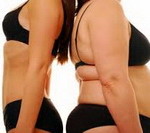10 tips for effective science based dieting are explained by the BBC documentary team in 2009. Michael Mosley is the test subject, and they visit researchers who have a range of tactics to diet effectively. Make sure you eat more protein; keep moving; eat more dairy product; understand food calories to make informed decisions; count calories; don’t skip meals; use smaller dinner plates; don’t go to buffets; eat soup, and swap higher energy calorie foods for equivalent tasty foods. Simple tactics that are scientifically proven to work.

Thousands of books. Billions of dollars. But society is continuing to get fatter, more un-healthy, and what to do about it stumped me. Personally. 10kg over my desired weight, but just within the healthy BMI range. At 24.9 I had another 0.1 before I was officially overweight. I was doing some exercise, restraining from too […]

Antioxidants are not necessarily vitamins, but some vitamins are antioxidants.
Anti-oxidation vs. oxidation has been billed as a contest between good and evil. It takes place in within cells in organelles called mitochondria, where the body converts food to energy — a process that requires oxygen (oxidation). One consequence of oxidation is the generation of atomic scavengers called free radicals (evil). Free radicals can damage DNA, cell membranes, and the lining of arteries. Not surprisingly, they have been linked to ageing, cancer, and heart disease. Before reviewing the scientific evidence, I thought that antioxidants were a little over-hyped but generally ineffective. We can see now that if you want to run the risk of increased cancer, take anti-oxidants. Eating some fruit and vegetables (note: fruit juice is not fruit) will reduce your weight and improve your health. The claim for health from consuming antioxidants has no evidence. For me any money spent on this sort of stuff is a complete waste of money. Do something useful. Help provide clean water to poor communities. That will do some good.




